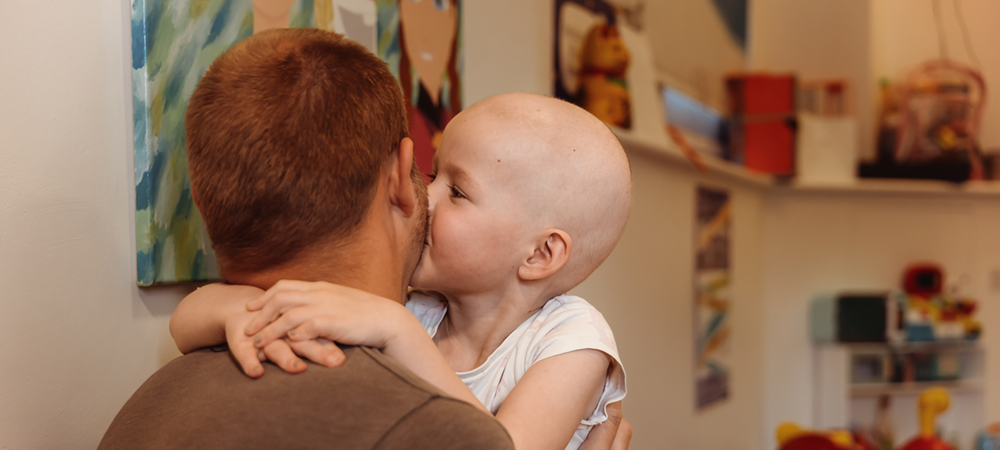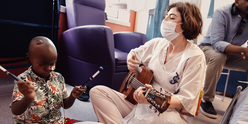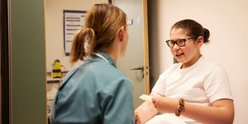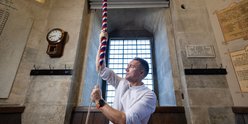‘The whole time we've been here, she hasn't been scared at all’: Meet Aubrey
5 Sep 2025, 10:22 a.m.
Meet Aubrey. She’s a chatty six-year-old who loves school, Pokémon, dinosaurs and Arsenal Football Club.
In 2025, Aubrey was diagnosed with leukaemia and transferred to Great Ormond Street Hospital (GOSH) for treatment. Her mum, Madeleine, shares her story.
Something wasn’t right
“Aubrey was a very healthy, happy child,” Madeleine says. “Then in the spring of 2025 she complained of really bad pain in her left leg and in her thigh. It went on for weeks.”
An X-ray didn’t reveal anything, and neither did further trips to the doctor.
But when Aubrey got a rash all over her body and began vomiting, Madeleine knew something was very wrong.
Aubrey was rushed to A&E for tests, where Madeleine and Aubrey’s dad, Sammy, were told she had leukaemia, a type of blood cancer.
Madeleine remembers the unimaginably difficult moment: “I was very distraught, I was sobbing, and her dad was very upset as well. The doctor was saying to us that Aubrey was really sick, and not just with leukaemia. There were other infections that were causing her issues.”
A worrying time
During this time, Aubrey’s oxygen levels had started to drop; her blood, liver and spleen were all affected by the leukaemia and infections.
It was an incredibly worrying time for the family. “She was just deteriorating more and more. They started getting worried and they moved us to a resus room [where patients with life-threatening conditions are cared for],” Madeleine says.
The decision was made that Aubrey needed to go to GOSH that night.
The kindness of GOSH staff
Aubrey was taken to the paediatric intensive care unit (PICU).
Madeleine remembers one PICU nurse in particular, Keira. She was “the loveliest nurse” who made that first night easier by reassuring her that Aubrey would be looked after and encouraging her to get some rest.
The next day, further tests revealed that Aubrey had B-cell acute lymphoblastic leukaemia, a type of blood cancer in which the bone marrow produces too many early-stage white blood cells that don’t work properly.
She was also diagnosed with a series of infections, including sepsis, which is a serious, life-threatening reaction to infection, and rhinovirus, the virus that usually causes the common cold which could cause complications like chest infections.
The extent of Aubrey’s infections meant doctors had to halve her first dose of chemotherapy, a strong medicine used to kill cancer cells.
During this time, Madeleine remembers the kindness of the staff who talked, played music and read stories to Aubrey to reassure her and keep her brain stimulated.
Madeleine recalls the emotional moment she saw her daughter starting to look more like herself. “The Play team came and made slime with her. And I think that was one of the moments that I thought, ‘Wow, this kid's going to be fine’.”
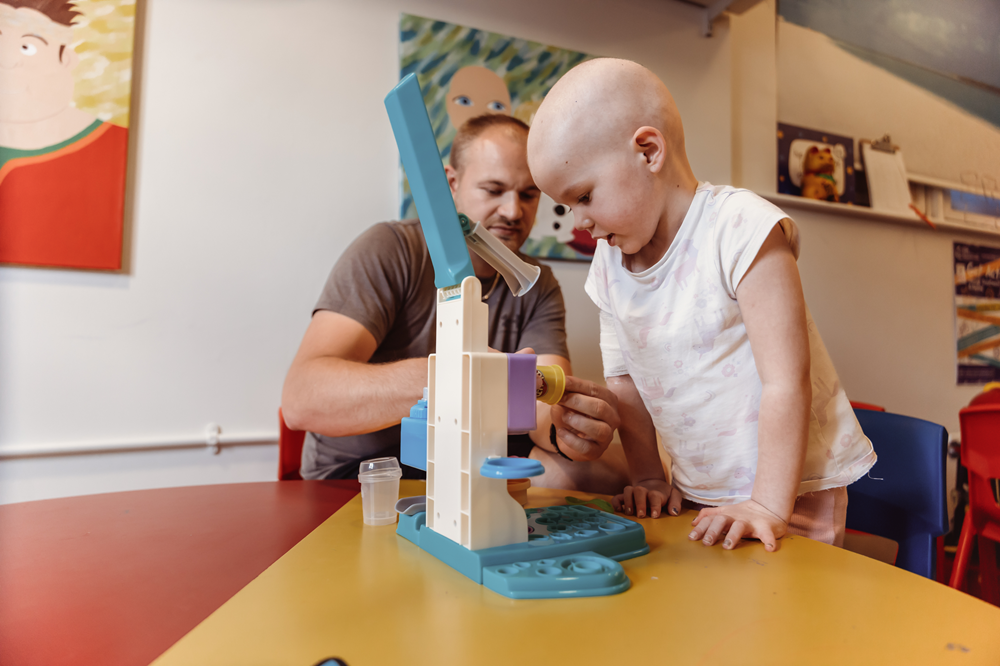
‘A lifeline’: GOSH support
For Madeleine, support from Great Ormond Street Hospital Charity (GOSH Charity) was invaluable.
“The accommodation that GOSH Charity offers for parents is brilliant,” she says. “Without the family accommodation, I wouldn't have been able to stay there. No one would have been able to stay with Aubrey because there's no way we could afford hotels in London.”
Madeleine was also given meal vouchers to use in the GOSH canteen. “The meal vouchers were very useful. There's nice food there, and it’s healthy. The staff are lovely there as well.”
Fun on Giraffe Ward
As Aubrey started to get better, she was moved to Giraffe Ward, which meant Madeleine was able to stay with her.
Madeleine has positive memories of the ward. “Everything's fun, everything’s play, even the nurses and doctors take time to play. They make it so it's not all medical and really heavy,” she says.
Despite everything Aubrey has been through, Madeleine says that “the whole time we've been here, she hasn't been scared at all.”
A cancer treatment plan
The infections Aubrey had meant that a gentler treatment called blinatumomab (or “blina”) was decided to be the best fit rather than chemotherapy. Blina is a medicine that helps the immune system recognise and attack the leukaemia cells.
Madeleine says Aubrey’s consultant was “brilliant” when it came to explaining her treatment plan. “He took his time to make sure that we knew what it would do, and how it would help Aubrey.”
While Aubrey was receiving treatment, she spent lots of time with the Play team. Funded by GOSH Charity since 2012, the Play team helps make hospital a bit less hard and a lot more fun. They also explain procedures and treatments, and help ease fears and anxieties, through play.
Because of the risk of infection, Aubrey wasn’t able to visit the playroom. To make sure she didn’t miss out, the Play team designed a special game for the Pokémon fan.
“They printed off little Pokémon pictures and put them around the ward so she would collect them,” Madeleine remembers. “Then they found a Pokémon plush and she caught that – the smile on her face, it was massive! She thought it was the best thing ever.”
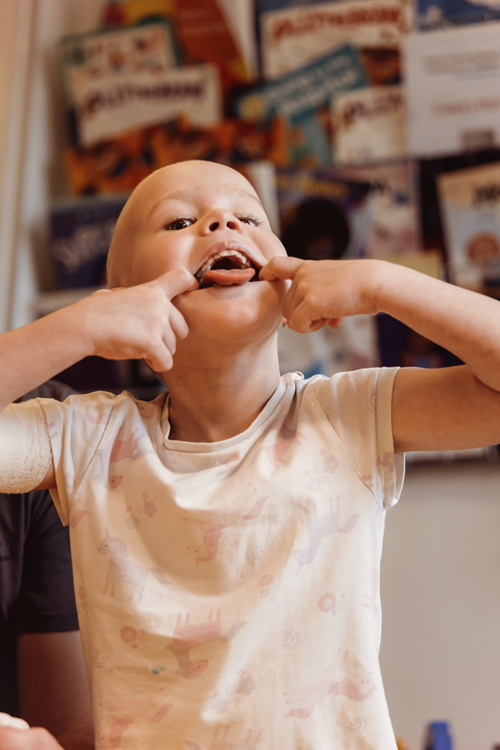
Building up Aubrey’s strength
To get Aubrey moving again, the Play team and Physio teams worked together to make physio fun.
“I think that one of the reasons she bounced back so quickly was because of the staff. They were so good with her, and they really pushed her to move about and start doing stuff,” Madeleine says.
As Aubrey got stronger, she was able to do more and more. Madeleine remembers Lucy from the Physio team taking Aubrey to the park and getting her an ice cream.
Six and a half weeks after being admitted, Aubrey was able to leave GOSH. And while she’s enjoying being at home, she gets “really excited” to go back to hospital and see the Play team and nurses again.
A new cancer centre for children like Aubrey
Madeleine believes that GOSH’s new Children’s Cancer Centre will be “amazing” and make a real difference for more children like Aubrey.
The centre will mean even better facilities and treatment, and more of the play, fun and home-from-home feeling that gives a child with cancer the best chance and the best childhood possible.
Join us to build the future of children’s cancer care at GOSH and help beat cancer for more children.


